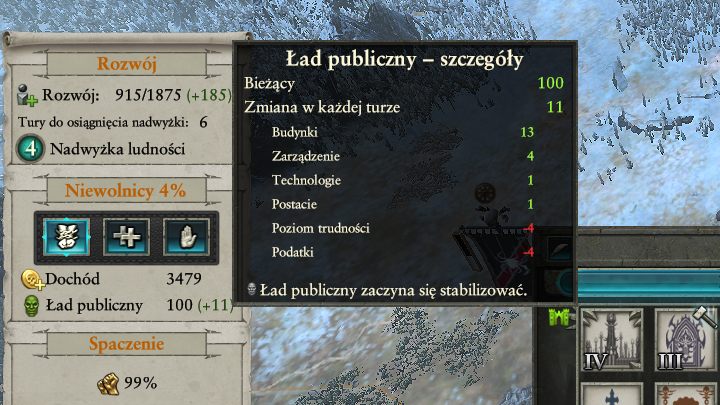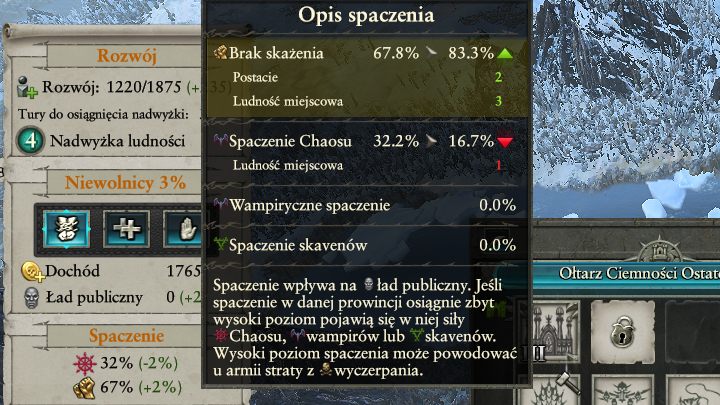Total War Warhammer 2: Controlling Public Order and Corruption
Last update:
Public order and corruption are both very important factors when it comes down to making sure your provinces run smoothly. Ill-planned constructions and bad control over the situation in the province will bring many negative effects, and after reaching critical mass, they may spur a rebellion. In this chapter, you may learn how to control these two mechanics.
Public order

The public order is simply the level of happiness of the population in the province. If it drops down to -100, you will face a rebellion - an army will appear not far from the city, and it will quickly grow in power. After some time, they will attack the city, and if you don't manage to defend it, they might ransack it. The rebel armies should be destroyed as soon as possible - that is, if you don't manage to prevent so much unrest in the first place.
A few factors can improve public order:
- The buildings in the province;
- Heroes and Lords in the province;
- Lord's army in one of the cities;
- A random event;
- A commandment in the province (you need to control every settlement of the province);
- Difficulty level - on easy, you get a +1 bonus to social order.
And a few others can lower it:
- An army in the plunder stance moving through the province;
- Corruption;
- Taxes;
- Province instability (if there are many wars over the given city);
- Capturing the given town (lasts one turn);
- Random events;
- Hero's actions;
- Difficulty level - on hard and the higher ones, you get a penalty to order.
The public order matters if you're planning a quick expansion. The newly conquered settlements will have a big penalty to happiness and the level of happiness is uniform across the whole province. That's why you should strive to control the whole province and then hold your offensive for a few turns, use your army to stabilize order and at the same time construct some buildings that will help you police the region. Don't forget about the suitable edict if it's available for your faction. You should also have your Lords develop the abilities that improve social order, and bring to the province those of your heroes, who have the same kind of abilities. This will let you contain the situation in new lands - the army will soon be able to proceed.
Corruption

The corruption works in a much the same way as the religions in previous games. The corruption can be checked in the province tab - there are four possible values: no corruption, Chaos Corruption, Vampire Corruption and Skaven Corruption. As with religion, the corruption spreads (or decreases) in a province, and you can check how big of a percentage of the population is under its influence. In the tab, you can also find information about how fast it spreads (or recedes). Hover over the corruption icon to learn more.
Remember to control the corruption levels in the provinces you control. For most playable factions, the corruption means only negative effects - reduced order and shrinking armies. The only exception here is the Cult of Pleasure faction - Chaos Corruption helps them, and the lack thereof means lower social order. The other exception are the Skaven - while their social order decreases due to corruption, they can also be aided by it - more about that in the chapter about the Skaven.
The level of corruption is influenced by:
- Buildings constructed in the province;
- Technologies;
- The characters that you can find in the province (lords and heroes) with the right abilities;
- Issued commandments.
Should a province with high corruption levels rebel, their army will belong to the faction that introduced the corruption.
- Total War: Warhammer II Game Guide
- Total War Warhammer 2: Game Guide
- Total War Warhammer 2: Campaign Map Gameplay
- Total War Warhammer 2: Choosing Faction
- Total War Warhammer 2: Interface
- Total War Warhammer 2: World Exploration
- Total War Warhammer 2: Settlement development and province climate
- Total War Warhammer 2: Controlling Public Order and Corruption
- Total War Warhammer 2: Diplomacy and Trade
- Total War Warhammer 2: Rituals and Eagle Gates
- Total War Warhammer 2: Controlling the Great Vortex
- Total War Warhammer 2: Campaign Map Gameplay
- Total War Warhammer 2: Game Guide
You are not permitted to copy any image, text or info from this page. This site is not associated with and/or endorsed by the developers and the publishers. All logos and images are copyrighted by their respective owners.
Copyright © 2000 - 2026 Webedia Polska SA for gamepressure.com, unofficial game guides, walkthroughs, secrets, game tips, maps & strategies for top games.
